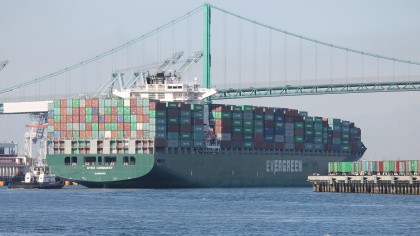Red Sea shipping attacks set to impact PC and electronics shipments across the world
Re-routing shipments will cost a lot of time and money

Holdups south of the Suez Canal and shipping companies avoiding the Red Sea altogether are likely to cause yet more delays and price rises in the technology space, experts have warned.
Reuters has confirmed that two major freight firms, including MSC, have confirmed plans to avoid the Red Sea as Houthi militants stepped up their assaults on commercial vessels in the Red Sea. Many companies have already started re-routing, while others are reported to have turned off tracking devices while navigating the area of conflict in the hope of passing through undetected.
Oil vessels have been a primary target for the movement, however other commercial ships including those bringing in components and hardware from Asia to Europe are also likely to become increasingly affected.
Consumers will suffer from Suez Canal attacks
The perpetrators have said that the aggression is aimed at Israel-bound ships in a show of support for Hamas, which has been in heightened conflict with Israel since early October 2023.
Already, fear over higher oil prices has started to spread across many of the countries that depend on the route that cuts through northern Africa and into Europe, but new reports are emerging that suggest the entire supply chain of numerous industries could be at risk.
A BBC report cites research from analysts at S&P Global Market Intelligence, which states that nearly 15% of the goods imported into Europe, the Middle East, and North Africa had been shipped from Asia and the Gulf by sea. Routing via the Red Sea will typically save ships thousands of miles and several days compared with passing the Cape of Good Hope, South Africa.
Already, the BBC says that shipping rates have risen by 4% in the past week. As they continue to rise, the extra costs incurred could be passed on to consumers.
Sign up to the TechRadar Pro newsletter to get all the top news, opinion, features and guidance your business needs to succeed!
For an endless list of reasons, including data sovereignty and protection, many European states have taken charge of their own infrastructure, and the continent’s cloud market is seeing significant growth.
All of this means that Europe relies heavily on importing chips and other components from Asian countries. A ship sailing from Taiwan via South Africa may take up to 10 more days to reach its destination in Europe compared with the 25 or so days it would take via the Red Sea, which could end up costing consumers and businesses even more.
The scale of the impacts on consumers is yet to reveal itself, but for now, we are being warned of more disruption to come.
More from TechRadar Pro
- Want to upgrade sooner rather than later? Check out the best workstations
- Sony has made a $2 million donation towards humanitarian aid for Israel-Gaza conflict
- After something more portable? Here are the best mobile workstations and best business laptops
With several years’ experience freelancing in tech and automotive circles, Craig’s specific interests lie in technology that is designed to better our lives, including AI and ML, productivity aids, and smart fitness. He is also passionate about cars and the decarbonisation of personal transportation. As an avid bargain-hunter, you can be sure that any deal Craig finds is top value!
